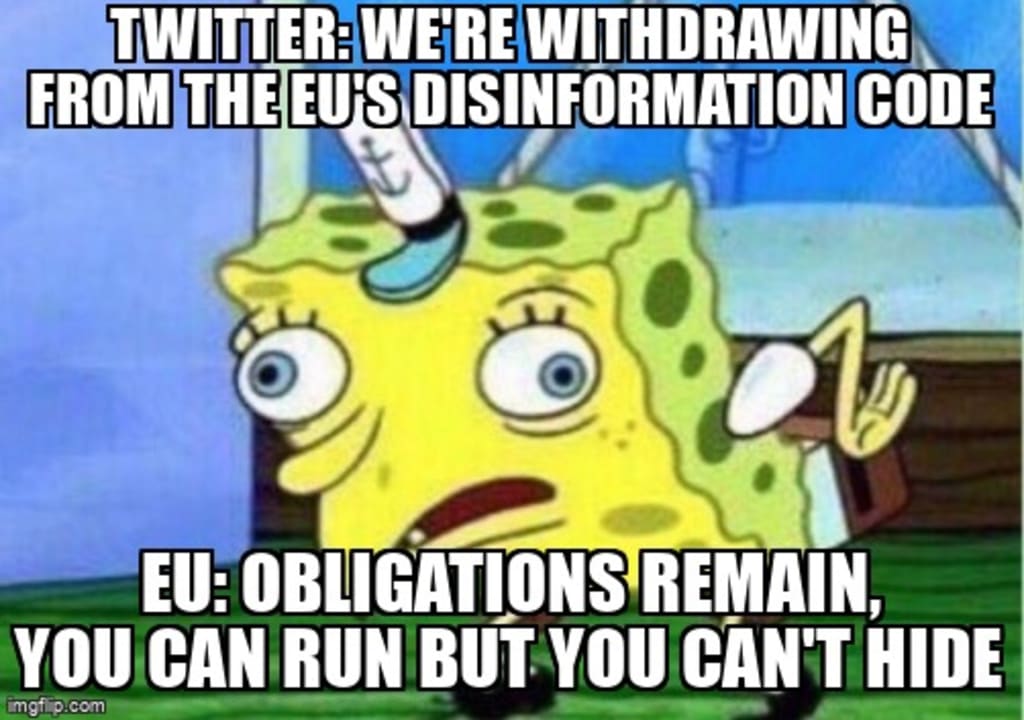Twitter's Departure from the EU's Disinformation Code: An In-depth Analysis
Twitter has yet to confirm its stance on the code or respond to requests for comment. This silence raises questions about the company's approach to tackling disinformation and its commitment to transparency.

In the rapidly evolving world of social media, the fight against disinformation has emerged as a critical issue. Platforms are grappling with the complex challenge of curbing the spread of false information while balancing the rights to freedom of speech. This issue has come to the forefront with Twitter's recent decision to withdraw from the European Union's voluntary code to combat disinformation, a move that has sparked widespread debate and scrutiny.
Thierry Breton, the EU's internal market commissioner, announced the news on Twitter. However, he warned the social media giant that new laws would enforce compliance. "Obligations remain. You can run but you can't hide," he stated, indicating that Twitter would be legally required to combat disinformation in the EU from 25 August. He added that their teams would be ready for enforcement, suggesting a firm stance on the issue.
Twitter's silence on the matter raises questions about the company's approach to tackling disinformation and its commitment to transparency. As one of the leading social media platforms, Twitter plays a significant role in the dissemination of information. Its approach to content moderation and disinformation can have far-reaching implications, affecting the experiences of millions of users worldwide.
The EU's disinformation code, launched in June last year, has been signed by dozens of tech firms, both big and small. These include Meta, which owns Facebook and Instagram, as well as TikTok, Google, Microsoft, and Twitch. The code aims to prevent profiteering from disinformation and fake news, increase transparency, and curb the spread of bots and fake accounts.
Firms that sign the code can choose which pledges to make, such as cooperating with fact-checkers or tracking political advertising. However, Twitter's withdrawal from the code suggests a divergence in its approach to tackling disinformation. This move has raised concerns about the effectiveness of voluntary codes in combating disinformation and the need for more stringent regulations.
Under the ownership of Elon Musk, moderation at Twitter has reportedly been significantly reduced. Critics argue that this has allowed an increase in the spread of disinformation. Last month, the BBC found hundreds of Russian and Chinese state propaganda accounts thriving on Twitter. This finding raises questions about the effectiveness of Twitter's current approach to content moderation and its impact on the spread of disinformation.
However, Musk claims that there is now "less misinformation rather than more" since he took over last October. This statement has sparked debate about the effectiveness of Twitter's current approach to content moderation and its impact on the spread of disinformation. As the owner of Twitter, Musk's views and actions on content moderation can significantly influence the platform's policies and practices.
In addition to the voluntary code, the EU has also introduced a Digital Services Act. This law obliges firms to do more to tackle illegal online content. Under this law, Twitter will have to implement a mechanism for users to flag illegal content, act upon notifications "expeditiously," and put in measures to address the spread of disinformation.
A European Commission official was quoted by AFP news agency as saying, "If (Elon Musk) doesn't take the code seriously, then it's better that he quits." This statement underscores the EU's firm stance on the issue of disinformation and its commitment to holding tech firms accountable.
In conclusion, Twitter's withdrawal from the EU's disinformation code marks a significant shift in the platform's approach to tackling disinformation. As social media platforms continue to grapple with the challenges of content moderation, the role of regulatory bodies like the EU in enforcing compliance and promoting transparency becomes increasingly important. The world will be watching closely to see how Twitter navigates these complex issues under its new leadership.
The departure of Twitter from the EU's disinformation code marks a significant moment in the ongoing battle against disinformation on social media. It underscores the challenges that platforms face in balancing the need for freedom of speech with the responsibility to prevent the spread of false information. It also highlights the limitations of voluntary codes and the potential need for more stringent regulations.
The role of social media platforms in the dissemination of information cannot be overstated. As such, their approach to content moderation and disinformation is of paramount importance. Twitter's decision to withdraw from the EU's disinformation code raises questions about its commitment to combating disinformation and the effectiveness of its current approach.
The EU's firm stance on the issue of disinformation, as evidenced by the comments of the EU's internal market commissioner and a European Commission official, underscores the seriousness with which it views this issue. It also highlights the EU's commitment to holding tech firms accountable for their role in combating disinformation.
As we move forward, the role of regulatory bodies like the EU in enforcing compliance and promoting transparency will become increasingly important. The introduction of the Digital Services Act is a step in this direction, obliging firms to do more to tackle illegal online content.
The world will be watching closely to see how Twitter navigates these complex issues under its new leadership. The decisions it makes and the actions it takes will have far-reaching implications, not just for its users, but for the broader fight against disinformation on social media.
About the Creator
John Wu
Tech lover, trying use AI do amazing things






Comments
There are no comments for this story
Be the first to respond and start the conversation.